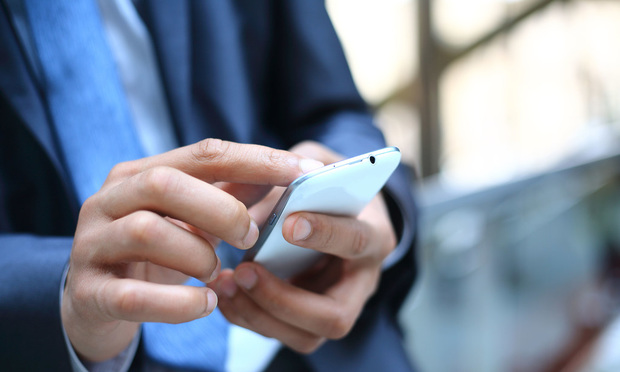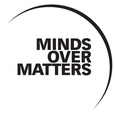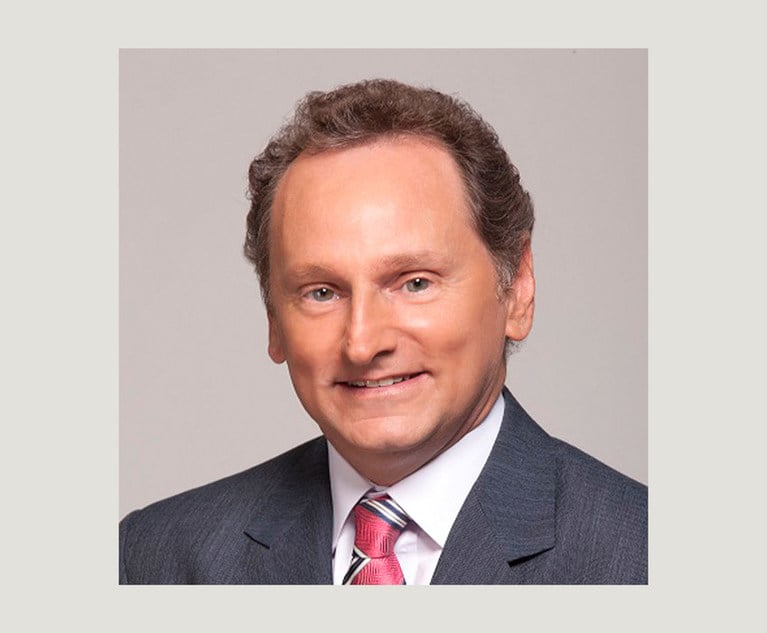Lawyers Turning to Tech for Mental Health Help
After seeing the pressures of legal work take a toll on attorneys, a growing number of legal professionals are launching mental health apps and resources to provide a helping hand.
June 18, 2019 at 11:26 AM
4 minute read

 Given its long hours and demanding work, practicing law can be a breeding ground for mental health issues, including depression, anxiety and stress.
Given its long hours and demanding work, practicing law can be a breeding ground for mental health issues, including depression, anxiety and stress.
In response, a number of lawyers and legal tech vendors are launching apps and mental health resources to address these issues head-on. While not all these tools specifically target lawyers, they provide a 24/7 source of mental health assistance for busy attorneys—at their fingertips.
"Law firms are not set up to be bastions of emotional support; they are set up to perform high-quality legal work around the clock," said Jeremy Fischbach, a former Big Law lawyer who now works at virtual legal service provider InCloudCounsel. He added, "The American law firm for a lot of people is a source of isolation because you are working 80 hours a week, you are not spending a lot of time with the people you care about the most."
To help with the work-related stress, Fischbach launched an app called Happy, which is aimed at connecting those who need to talk to someone supportive.
"I created Happy because for me personally and for a lot of lawyers I know, traditional sources of support, including my primary network of family and friends and secondary traditional offerings [like] psychotherapy, weren't working," he said.
The Happy app allows a user to select a topic they want to discuss, including relationships, work/career, finances and parenting, and anonymously talk to a "trained listener" about those matters.
To be sure, the pressures of the legal industry are evident to those who work beside lawyers, such as legal tech vendors. Shimmy Messing, who served as chief technology officer for e-discovery platform Advanced Discovery before it was acquired by Consilio, spent 15 years improving the workflow of legal software platforms and saw firsthand the pressure of lawyers' job.
The nCourage app is Messing's latest creation for improving attorney workflow. But instead of managing data, nCourage aims to provide general users with techniques to better channel their stress and anxiety "for positive workflow for your day-to-day life," he said.
On a smartphone, an nCourage user selects an issue he or she wants to improve, either anxiety/stress, falling asleep, personal growth or work/productivity. Next, he or she will read modules created by Dr. Dan Lerner that offer tips to understanding and managing his or her challenge.
While Messing and Fischbach's apps address anxiety and stress, their target audience isn't just lawyers or those working in the legal industry. Which isn't to say that lawyer-specific mental help resources don't exist.
In 2018, for instance, the American Bar Association released the 99-page "Well-Being Toolkit for Lawyers and Legal Employers" document that included an eight-step action plan for legal employers, guidance for evaluating what supports and harms well-being and other information.
"We chose the toolkit as a project because, after the National Task Force report ["The Path to Lawyer Well-Being: Practical Recommendations for Positive Change"] was issued [in 2017], many law firms and other legal employers were interested in getting involved but were asking for more information about how to get started," wrote the toolkit's writer Anne Brafford in an email. "The toolkit was designed to address that need."
Meanwhile, some law firms are also taking the initiative to address mental health issues and stigma by making technological well-being assistance available in addition to in-person services. For instance, Kirkland & Ellis, which hired lawyer-turned-therapist Robin Belleau to lead its wellness effort last month, announced internally on Monday the launch of two apps to encourage managing stress and balancing work-life demands.
App Whil offers "in-the-moment and goal-based programs" to help reduce stress, improve sleep and enhance productivity, according to an email from the firm. Meanwhile WorkIt allows users to access a personalized set of clinically based education programs and one-on-one support from coaches to manage behaviors before they lead to addiction, the firm said.
"The apps are an important aspect of our comprehensive approach to well-being," wrote a Kirkland & Ellis representative in an emailed statement. "They are flexible and accessible, which was especially important for our lawyers. They give users an abundance of information, resources and support around the clock, at their fingertips, whenever they have the time or desire to access it."
Read more: Minds Over Matters: An Examination of Mental Health in the Legal Profession
This content has been archived. It is available through our partners, LexisNexis® and Bloomberg Law.
To view this content, please continue to their sites.
Not a Lexis Subscriber?
Subscribe Now
Not a Bloomberg Law Subscriber?
Subscribe Now
NOT FOR REPRINT
© 2025 ALM Global, LLC, All Rights Reserved. Request academic re-use from www.copyright.com. All other uses, submit a request to [email protected]. For more information visit Asset & Logo Licensing.
You Might Like
View All

Sonos' Legal Chief Sees Pay More Than Quadruple Amid Executive Upheaval
3 minute read
'David and Goliath' Dispute Between Software Developers Ends in $24M Settlement

Turning Over Legal Tedium to AI Requires Lots of Unglamorous Work on Front End
6 minute readTrending Stories
- 1Departing Attorneys Sue Their Former Law Firm
- 2Pa. High Court: Concrete Proof Not Needed to Weigh Grounds for Preliminary Injunction Order
- 3'Something Else Is Coming': DOGE Established, but With Limited Scope
- 4Polsinelli Picks Up Corporate Health Care Partner From Greenberg Traurig in LA
- 5Kirkland Lands in Phila., but Rate Pressure May Limit the High-Flying Firm's Growth Prospects
Who Got The Work
J. Brugh Lower of Gibbons has entered an appearance for industrial equipment supplier Devco Corporation in a pending trademark infringement lawsuit. The suit, accusing the defendant of selling knock-off Graco products, was filed Dec. 18 in New Jersey District Court by Rivkin Radler on behalf of Graco Inc. and Graco Minnesota. The case, assigned to U.S. District Judge Zahid N. Quraishi, is 3:24-cv-11294, Graco Inc. et al v. Devco Corporation.
Who Got The Work
Rebecca Maller-Stein and Kent A. Yalowitz of Arnold & Porter Kaye Scholer have entered their appearances for Hanaco Venture Capital and its executives, Lior Prosor and David Frankel, in a pending securities lawsuit. The action, filed on Dec. 24 in New York Southern District Court by Zell, Aron & Co. on behalf of Goldeneye Advisors, accuses the defendants of negligently and fraudulently managing the plaintiff's $1 million investment. The case, assigned to U.S. District Judge Vernon S. Broderick, is 1:24-cv-09918, Goldeneye Advisors, LLC v. Hanaco Venture Capital, Ltd. et al.
Who Got The Work
Attorneys from A&O Shearman has stepped in as defense counsel for Toronto-Dominion Bank and other defendants in a pending securities class action. The suit, filed Dec. 11 in New York Southern District Court by Bleichmar Fonti & Auld, accuses the defendants of concealing the bank's 'pervasive' deficiencies in regards to its compliance with the Bank Secrecy Act and the quality of its anti-money laundering controls. The case, assigned to U.S. District Judge Arun Subramanian, is 1:24-cv-09445, Gonzalez v. The Toronto-Dominion Bank et al.
Who Got The Work
Crown Castle International, a Pennsylvania company providing shared communications infrastructure, has turned to Luke D. Wolf of Gordon Rees Scully Mansukhani to fend off a pending breach-of-contract lawsuit. The court action, filed Nov. 25 in Michigan Eastern District Court by Hooper Hathaway PC on behalf of The Town Residences LLC, accuses Crown Castle of failing to transfer approximately $30,000 in utility payments from T-Mobile in breach of a roof-top lease and assignment agreement. The case, assigned to U.S. District Judge Susan K. Declercq, is 2:24-cv-13131, The Town Residences LLC v. T-Mobile US, Inc. et al.
Who Got The Work
Wilfred P. Coronato and Daniel M. Schwartz of McCarter & English have stepped in as defense counsel to Electrolux Home Products Inc. in a pending product liability lawsuit. The court action, filed Nov. 26 in New York Eastern District Court by Poulos Lopiccolo PC and Nagel Rice LLP on behalf of David Stern, alleges that the defendant's refrigerators’ drawers and shelving repeatedly break and fall apart within months after purchase. The case, assigned to U.S. District Judge Joan M. Azrack, is 2:24-cv-08204, Stern v. Electrolux Home Products, Inc.
Featured Firms
Law Offices of Gary Martin Hays & Associates, P.C.
(470) 294-1674
Law Offices of Mark E. Salomone
(857) 444-6468
Smith & Hassler
(713) 739-1250








